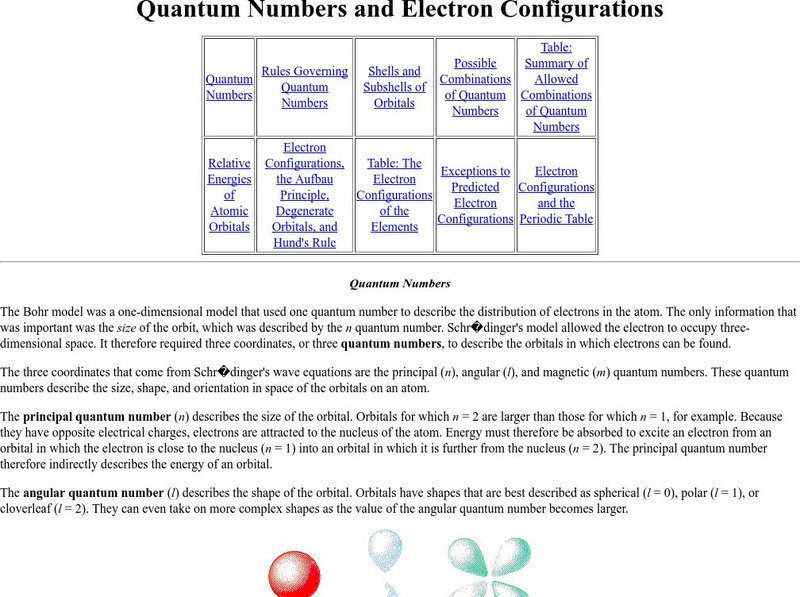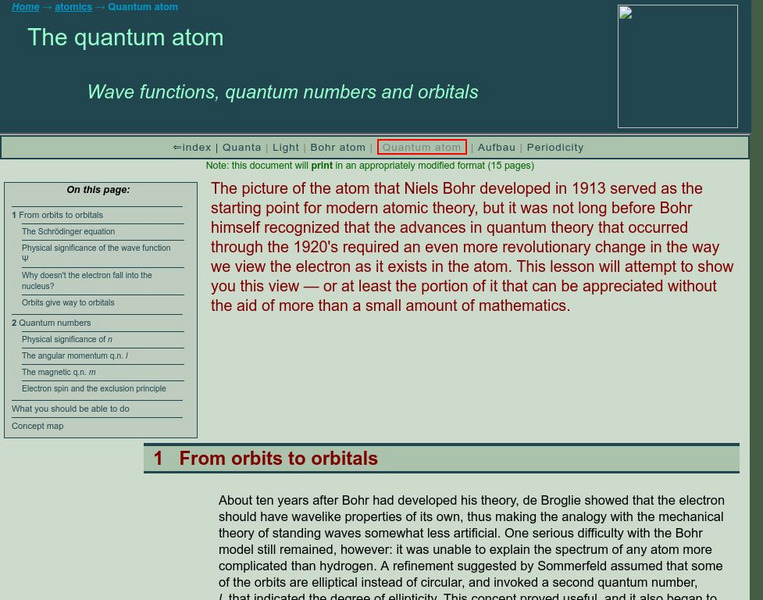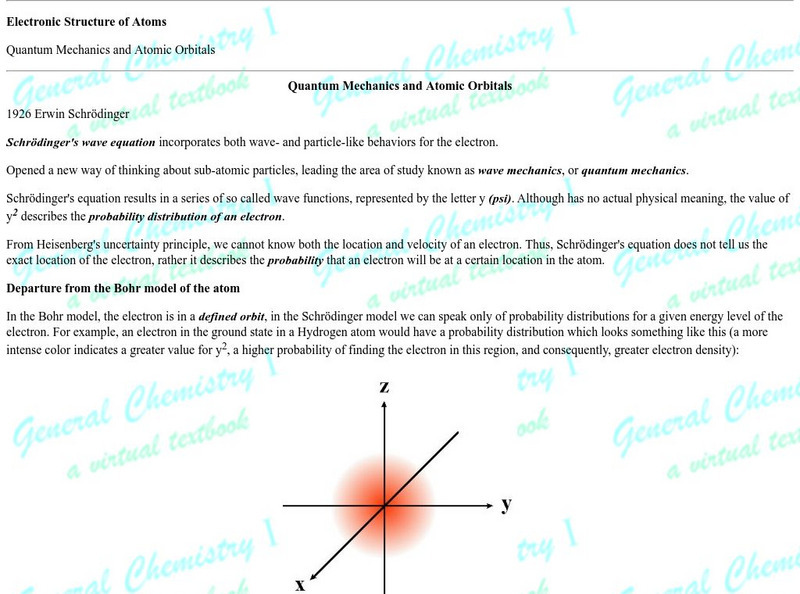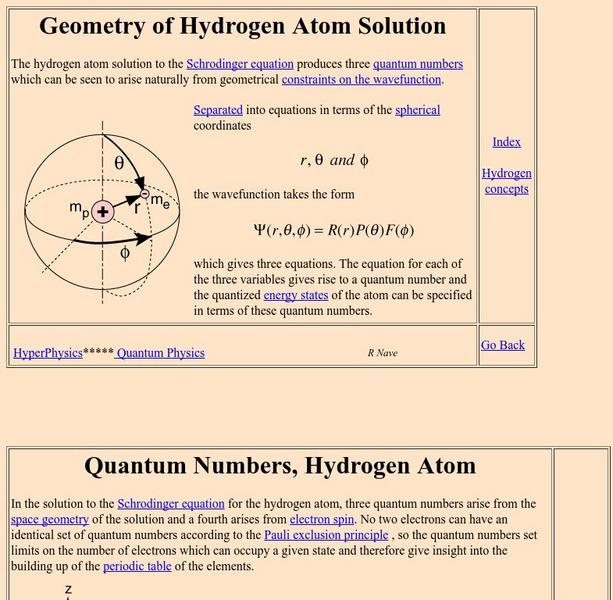Curated OER
Electron Configuration and Quantum Mechanics
In this electron configuration and quantum mechanics worksheet, students identify the 4 symbols for quantum numbers, they complete an electron filling diagram, they complete orbital diagrams for 8 elements and they write the notation...
Royal Society of Chemistry
Sub-shells
Is your class in a quandary over quantum numbers? Change things up by adding games to the mix! Science scholars discover the shape, number of electrons, and number of orbitals in the s, p, and d sub-shells using an interactive.
Curated OER
The Modern Atom
In this modern atom worksheet, students answer 7 questions about electron configurations of atoms, flame tests, spectroscopy, the energy of electrons and quantum numbers. Students write electron configurations and orbital filling diagrams.
Concord Consortium
Energy Levels of a Hydrogen Atom
Tired of blowing up countless balloons to illustrate orbital shapes around an atom? Give your lungs a break and use an interactive instead! Learners observe s, p, d, and f orbitals through the first four energy levels using hydrogen as a...
Curated OER
Elements, Atoms, Ions, and the Periodic Table
This PowerPoint provides a complete recap of all the information needed for a unit on elements and the periodic table. The seventy slides cover the basic notation of elements, energy levels and ionization energies. The trends in the...
Curated OER
Quantum Numbers and Electron Configuration Worksheet
In this electron worksheet students find values for the given letters including their subshells and in which orbital it occurs.
Curated OER
2002 U.S. National Chemistry Olympiad National Exam - Part I
As to be expected from the American Chemical Society Olympiad Examinations Task Force, this 60-question test tops the charts in terms of excellence. It consists entirely of multiple choice questions designed to assess a year's worth of...
Curated OER
Electron Configurations and Orbital Diagrams
For this elements worksheet, students determine the electron configuration, orbital diagram for the highest sublevel, and the number of unpaired electrons in ground state atom for the given elements. This worksheet has 7 problems to solve.
Curated OER
Physics 152 Fall 2004 Final Exam, Parts A, B, C, D
At the end of a general physics course focused on light and electricity, you can administer this exam. Concepts covered include electromagnetism, circuits, induction, light rays, lenses and mirrors, characteristics of light, electron...
Curated OER
Electron Configuration Worksheet
In this chemistry activity, students complete the table for each element by writing the electron configuration of the element and giving the values of the four quantum numbers. They also create an energy level diagram for their element...
Curated OER
Electrons and Atoms
In this atoms worksheet, students determine the velocity, wavelength, power, and frequency of given atoms. Student describe wave-particle duality and give the principle and angular quantum numbers for given orbitals. This worksheet has...
Curated OER
Unit 2 ~ Atomic Structure
As an atomic structure reference and review tool, this handout fits the bill. The first page provides definitions and tables of orbitals, electrons, and energy levels. The second page is an opportunity to practice determining numbers of...
Curated OER
Elements
In this elements worksheet, students write the complete electronic configuration and the number of valence electrons for elements. Students classify elements based on their electronic configuration. This worksheet has 5 problems to solve.
Curated OER
Order, Order All Electrons
Students read the periodic table and apply their knowledge of the construction of atoms. They demonstrate reading the electron configuration of an element on the periodic file.
University of Colorado
University of Colorado: Physics 2000: Elements as Atoms: Quantum Numbers
Each electron has a set of quantum numbers that specify it's location, orbital, and energy in a unique manner.
Purdue University
Purdue University: Quantum Numbers & Electron Configurations
This site from the Purdue University provides quantum numbers explained in detail and shown how they specify the atomic orbital of each electron and their energy levels. Electronic configurations are explained. Learning exercises with...
Simon Fraser University
Chem1 Virtual Textbook: The Quantum Numbers
Acting as a subtopic of the General Chemistry Virtual Textbook's section on Atoms and the Periodic Table, this site discusses quantum numbers of electrons in atoms including topics such as principal quantum number and orbitals of the...
Crescent Public Schools
The Internet Science Room: Quantum Numbers
Using diagrams, illustrated examples, and student practice this chemistry class tutorial explains quantum numbers.
Michael Blaber, PhD
Fsu: Electronic Structure of Atoms: Quantum Mechanics & Atomic Orbitals
This article is provided by Florida State University. Schroedinger wave equation is explained and how quantum numbers are used to describe the energy level of any electron in an atom. The relationship of atomic orbitals to quantum...
Purdue University
Purdue University: Orbital Shells
This site from the Purdue University provides an overview of atomic orbitals and how quantum numbers specify these orbitals. Includes a model that can be rotated and examined in 3D. Includes learning exercises and answers.
Georgia State University
Georgia State University: Hyper Physics: Quantum Numbers, Hydrogen Atom
This tutorial contains links to explanations of the four different quantum numbers (principal, orbital, magnetic, and spin). Equations for each are provided.
CK-12 Foundation
Ck 12: The Quantum Mechanical Model
[Free Registration/Login may be required to access all resource tools.] In the following online tutorial students will calculate the wavelength, frequency, and energy of light using Planck's constant and the speed of light. They will...
Vision Learning
Visionlearning: Atomic Theory and Structure: Quantum Numbers and Orbitals
Explanation of advanced atomic theory using The Schrodinger equation.
Other
University of Texas: Tabled Discussion
At this University of Texas site, atomic orbital occupancy, quantum numbers, the Aufbau Principle, and periodic trends are described in detail.






















